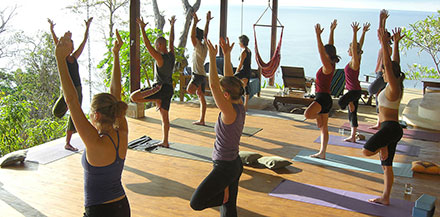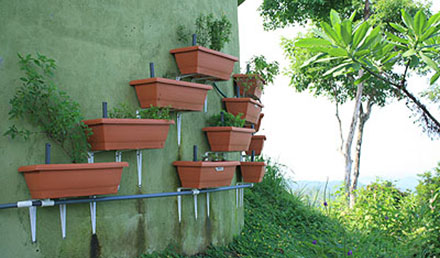


|
Commenced:
|
01/02/2009 |
|---|---|
|
Submitted:
|
12/04/2013 |
|
Last updated:
|
07/10/2015 |
|
Location:
|
300 MTRS N-E DEL MARIPOSARIO, Montezuma, Cobano, PUNTARENAS, CR |
|
Phone:
|
50688444726 |
|
Website:
|
http://www.anamayaresort.com |
|
Climate zone:
|
Wet/Dry Tropical |
Organic and sustainable yoga retreat center in Montezuma, Costa Rica

Anamaya is a yoga retreat center which has several permaculture demonstration features, such as a vertically-oriented Aquaponic Herb Garden (shown below). This is attached to the outside wall of our swimming pool. The growing medium is gravel, and our Tilapia fish are inside a tank underneath the pool.
There are also several gardens, on the property, with small demonstration gardens based on the permaculture principles at Anamaya's farm within the nearby Rancho Delicioso eco village project (also shown here at permacultureglobal.org)

Retreat guests participate in more than just yoga. We offer nature walks to our nearby waterfall, organic healthy cooking classes, meditation, and more.
Note: The various badges displayed in people profiles are largely honesty-based self-proclamations by the individuals themselves. There are reporting functions users can use if they know of blatant misrepresentation (for both people and projects). Legitimacy, competency and reputation for all people and projects can be evidenced and/or developed through their providing regular updates on permaculture work they’re involved in, before/after photographs, etc. A spirit of objective nurturing of both people and projects through knowledge/encouragement/inspiration/resource sharing is the aim of the Worldwide Permaculture Network.
 |
MemberA member is a permaculturist who has never taken a PDC course. These cannot become PDC teachers. Members may be novice or highly experienced permaculturists or anywhere in between. Watch their updates for evaluation. |
|---|---|
  |
Permaculture MatchmakerOne of these badges will show if you select your gender and the "I'm single, looking for a permaculture partner" option in your profile. |
 |
PDCPeople who claim to have taken a Permaculture Design Certificate (PDC) course somewhere in the world. |
 |
PDC VerifiedPeople who have entered an email address for the teacher of their PDC course, and have had their PDC status verified by that teacher. Watch their updates for evaluation. |
 |
PRI PDCPeople who’ve taken a Permaculture Research Institute PDC somewhere in the world. |
 |
PDC TeacherPeople who claim to teach some version of PDC somewhere in the world. |
 |
PRI TeacherWith the exception of the ‘Member’ who has never taken a PDC, all of the above can apply to become a PRI PDC Teacher. PRI PDC Teachers are those who the PRI recognise, through a vetting board, as determined and competent to teach the full 72-hour course as developed by Permaculture founder Bill Mollison – covering all the topics of The Designers’ Manual as well as possible (i.e. not cherry picking only aspects the teacher feels most interested or competent in). Such teachers also commit to focussing on the design science, and not including subjective spiritual/metaphysical elements. The reason these items are not included in the PDC curriculum is because they are “belief” based. Permaculture Design education concerns itself with teaching good design based on strategies and techniques which are scientifically provable. PRI PDC Teachers may be given teaching and/or consultancy offerings as they become available as the network grows. |
 |
Aid WorkerThe individual with this badge is indicating they are, have, or would like to be involved in permaculture aid work. As such, the individual may or may not have permaculture aid worker experience. Watch their updates for evaluation. |
 |
ConsultantThe individual with this badge is indicating they are, have, or would like to do paid permaculture design consultancy work. As such, the individual may or may not have permaculture consultancy experience. Watch their updates for evaluation. |
 |
Community ProjectCommunity projects are projects that help develop sustainable community interaction and increase localised resiliency. |